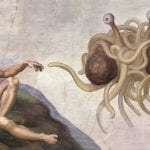 Movies and TV
Movies and TV  Movies and TV
Movies and TV  Humans
Humans 10 Times Scientists Were Absolutely Sure… and Absolutely Wrong
 Our World
Our World 10 Pivotal Moments for Life on Earth
 Movies and TV
Movies and TV 10 Most Realistic Medical TV Shows of All Time
 Creepy
Creepy 10 Eerie & Mysterious Ghosts of the Pacific Coast
 Weird Stuff
Weird Stuff 10 Typos That Accidentally Changed History
 History
History 10 Times Trickery Won Battles
 Technology
Technology 10 Awesome Upgrades to Common Household Items
 Misconceptions
Misconceptions 10 Hilarious (and Totally Wrong) Misconceptions About Childbirth
 Weird Stuff
Weird Stuff 10 Warning Labels That Exist Because Someone Actually Tried It
 Movies and TV
Movies and TV 10 Zombie Movies That Will Actually Terrify You
 Humans
Humans 10 Times Scientists Were Absolutely Sure… and Absolutely Wrong
 Our World
Our World 10 Pivotal Moments for Life on Earth
Who's Behind Listverse?

Jamie Frater
Head Editor
Jamie founded Listverse due to an insatiable desire to share fascinating, obscure, and bizarre facts. He has been a guest speaker on numerous national radio and television stations and is a five time published author.
More About Us Movies and TV
Movies and TV 10 Most Realistic Medical TV Shows of All Time
 Creepy
Creepy 10 Eerie & Mysterious Ghosts of the Pacific Coast
 Weird Stuff
Weird Stuff 10 Typos That Accidentally Changed History
 History
History 10 Times Trickery Won Battles
 Technology
Technology 10 Awesome Upgrades to Common Household Items
 Misconceptions
Misconceptions 10 Hilarious (and Totally Wrong) Misconceptions About Childbirth
 Weird Stuff
Weird Stuff 10 Warning Labels That Exist Because Someone Actually Tried It
Top 10 Criminals That Changed Music History
The rock and roll lifestyle is not known for following the rules. Usually, this amounts to merely trashing a hotel room. A few musicians took it a bit further. These hardened criminals impacted some of the most celebrated music ever recorded while committing heinous acts. Their talent is undeniable it, but these 10 composers would have been better off spending more time in the studio than the jailhouse.
10 Infectious Diseases That Changed History
10 The Cult that Created Fleetwood Mac
Before Fleetwood Mac made cocaine imbued sundrenched pop, they made cocaine imbued gritty blues. Cofounded by Jeremy Spencer, Fleetwood Mac had early success in America with their single “Albatross.” While promoting the record, Spencer left to pick up some groceries. He never returned.[1] On the way to the store, he started talking to members from the infamous cult, the Church of God. Converted to the organization, he abandoned the band. In subsequent years both the sect and Spencer were exposed as rampant child abusers.[2]
In 1971, the band had more pressing concerns. Down a member, the group recruited Bob Welch to finish the leg of the American tour. The Welch helmed years were a transitional moment for the act. Discarding their bluesy sounds, the band shifted to a more polished style. The new vibe landed them their first Top 40 album. Disagreements and fall out eventually led to Welch’s ouster. In his spot, Mick Fleetwood hired old friends Lindsey Buckingham and Stevie Nicks, the lineup that conquered the 1970’s.
9 When Hall Met Oates
Hall and Oates are rarely associated with gangland violence. Based on their hits, the biggest threats they face are man-eating flings. Before they were the most successful duo in American chart history, they were two separate musicians scrounging for gigs.
In 1967, each independently entered their respective acts into the Adelphi Ballroom’s Battle of the Bands.[3] Daryl Hall sang doo-wop vocals for the Temptones. John Oates played with the Masters. Not grasping that Battle of the Bands was just a metaphor, rowdy fans assaulted each other in the stands. Rival gang affiliated fraternities pulled out knives and guns. As shots rang out, Hall and Oates collectively decided that neither could go for that. The two ducked into a service elevator. They got to chatting about music and their studies at Temple University. By 1971, they were churning out blue eyed soul masterpieces together.
8 Motörhead’s Revenge
Hawkwind did a lot of drugs. One does not write meandering futuristic prog rock without a little help. Including playing on the first four albums, bandmember Ian “Lemmy” Kilmister was the band’s supplier. After being busted for transporting amphetamine over the Canadian border, he was unceremoniously kicked out of both roles.[4]
For hours, Kilmister stewed in a holding cell. He anxiously waited for his fellow bandmates to bail him out. Eventually, they sprang him. It was not out of any comradery; they just could not find a replacement in time for a Toronto show. Kilmister quit the band to seek revenge.
His sabotage plan was twofold. First, he would sleep with his former bandmates’ wives and girlfriends.[5] Except for lead singer Dave Brock’s wife, mission accomplished. Second, he would start his own band. That subsequent band, Motörhead, became one of the quintessential bands in heavy metal history. He got his revenge.
7 The Fightin’ Side of Merle Haggard
Outlaw country was more than merely a name. For Merle Haggard, it was a self-defeating lifestyle.[6] Haggard spent his adolescence in and out juvenile facilities. His ever-expanding rap sheet of petty crimes culminated in a botched robbery. Set out to steal a diner after hours, Haggard mentally prepared by drinking. While the restaurant was filled with customers, he staggered in drunk. He was promptly arrested. After unruly behavior with other inmates, he was transferred to San Quintin.
At the notorious Californian prison, Haggard befriended fellow inmate James “Rabbit” Kendrick. Kendrick confided in Haggard he had concocted an escape plan. Haggard was gung-ho to bust out. Kendrick dissuaded Haggard from tagging along. Instead of risking it all on a doomed venture, Kendrick convinced Haggard to commit to his musical aspirations. When Kendrick broke out, he shot an officer. Upon capture, Kendrick was executed. If he had accompanied Kendrick, a seminal country artist would have died unrecorded. Instead, he took Kendrick’s advice and resorted to only singing about felonies.
6 A Family Affair
The Black Mafia Family had enough money. Through their three main hubs of cocaine traffic, they raked in millions of dollars annually. Kingpin brothers, Demetrius “Big Meech” and Terry Flenory, needed a front for their operation. To hide the true source of their income and raise a little extra dough on the side, they founded record label BMF Entertainment. With that accidental decision, they created a new genre of music.[7]
BMF Entertainment only had one legitimate client, Bleu DaVinci. The rest of its roster was burgeoning rappers in the Atlanta area, including future breakout stars Fabolous and Young Jezzy. The drug trade bankrolled promotions for acts associated with the label. The premiere of Let’s Get It: Thug Motivation 101, Jeezy’s debut record, was equally a showcase for the rapper and a chance to build up connections in the community. Despite their intentions, Let’s Get It became the foundational text for Trap music, an offshoot of southern hip-hop. Popularized in Georgian crack dens, the style has become the dominant sound of hip-hop in the decades since.
10 Controversial Artifacts That Could Have Changed History
5 Charles Manson Freaked Out
In July 1969, following Charles Manson’s orders, Bobby Beausoleil broke into music teacher Gary Hinman’s house. For three days, Beausoleil tortured Hinman until he fatally stabbed him. Days before the Tate murders, Hinman was the first death of the Family’s killing spree.[8]
Before the murder, Beausoleil was a guitarist in psychedelic rock band the Grass Roots with Arthur Lee, (not to be confused with the more successful Grass Roots). Beausoleil was kicked out and replaced with Bryan MacLean. In a reference to Beausoleil, Maclean and Lee changed the band’s name to Love. Beausoleil’s departure fostered Lee and MacLean’s partnership to create one of the most influential rock groups of the 1960’s, most notably with the highly celebrated album “Forever Changes.”[9]
Falling out with Love, Beausoleil befriended Frank Zappa. He sang backup on Zappa’s first record, “Freak Out!” “Freak Out!” is applauded as establishing the idea of a rock concept album. It was the record that most inspired the Beatles to record Sgt. Pepper’s. So, while the Manson Family members were listening to Beatles’ songs, the Beatles were listening to a song from a Manson Family member.
4 The Samurai Hijackers
Everything Les Rallizes Denudes did was mysterious. The lead singer Takashi Mizutani is an enigmatic hermit who only occasionally makes public appearances. Refusing to release proper albums, their songs exists as rare bootlegs. Even their music is a structureless, equal parts chaotic and ethereal. Only two facts are certain. The first is that their music inspired leagues of imitators. The second is that their bassist Moriaki Wakabayashi hijacked a plane and headed for North Korea.[10]
On March 31, 1970, the Red Army seized Japan Airlines Flight 351 heading to Fukuoka. Brandishing samurai swords and pipe bombs, the communist faction took the 122 passengers and 7 crewmembers hostage. The 9 hijackers stormed the cockpit to force a flight to Cuba. With just enough fuel to travel the initial 45-minute route, the hijackers allowed the plane to land. On the tarmac, authorities swarmed the plane. For three days, the captors held the aircraft until they promised to release all the hostages in exchange for passage to Pyongyang, North Korea.
The national coverage drew attention to their bandmember’s former discography. As a strictly underground group, most people had never heard of the band. The hijacking exposed the group to legions of new fans internationally. Alternative acts like Sonic Youth and LCD Soundsystem grew to appreciate the band’s influence.
3 The Mynah Jailbirds
The Mynah Birds shaped music history without releasing a single album. Like any great rock n’ roll story, this one starts with a drunken street fight. 15-year-old Ricky James Matthews, an expatriate from America, fled to Canada to dodge the draft. Three hooligans cornered him in a botched mugging. Levon Helm and Garth Hudson, soon members of the legendary Canadian group The Band, rescued him. Endeared by Matthews’ gregarious personality, Hudson and Helm introduced him to other members of Toronto’s music scene, including the Mynah birds.[11]
With Matthews as their frontman, the band found middling success. Piqued by their R&B infused rock ‘n’ roll, struggling folk artist Neil Young joined the band. In 1965, The Mynah Birds traded bassists with local band The Sparrows. In exchange, Bruce Palmer joined The Mynah Birds. After Nick St. Nichols joined The Sparrows, they changed their name to Steppenwolf.
This final lineup hired Morley Shelman as their manager. Shelman secured an audition for Motown records. Matthews, worried about crossing into Detroit, told Shelman he was a fugitive. Producer Berry Gordy signed the group. When the Mynah Birds did not receive the label’s advance, they confronted Shelman. Shelman blew all the funds on heroin. They fired him. In retaliation he told, Gordy that Matthews was on the run. With Matthews arrested, the band broke up. Palmer and Young left for Los Angeles to start the protest folkie outfit Buffalo Springfield. After he left prison, Matthews returned to work as a Motown songwriter. In-house genius Stevie Wonder proposed that Mathews needed a punchier stage name. Wonder suggested Rick James.
2 A Colonel of Truth?
Colonel Tom Parker was undeniably a crook. The only question is for what crimes. With manipulative contracts, Parker exploited Elvis Presley throughout the famed career. Controlling every aspect of the King of Rock and Roll’s life, Parker’s backroom deals scammed millions of rightful profits. Parker always got by on bluster.
Parker’s first started entertaining as a carnival barker. He made his name touring the country with a sadistic routine where he shocked chickens with electric wires. He had to keep moving. He was on the lam.[12]
Born Andreas van Kuijk, Parker illegally entered the United States. An immigrant from the Netherlands, Parker never sought naturalization in America. Some speculate his hesitation was due to guilt from a murder. The evidence is scant. In the days before van Kuijk abandoned his homeland, a local shopkeeper was beaten to death. The only real clue tying van Kuijk to the cold case was an anonymous letter written decades later asserting his role in the slaying. The identity of the killer will likely never be solved. Neither will the mystery of why van Kuijk fled that same month in 1929 without telling his family or friends or traveling with his identity papers. He landed on America’s shores with no money. Whatever his motivation to desperately get out of town, he would soon find riches only attainable through nefarious means. Perhaps he already had experience.
1 Lead Belly Shaped and Took Lives
Music literally saved Lead Belly’s life. In 1918, he killed a man in a fight. Sentenced to thirty years in state prison, he petitioned Governor Pat Neff for a pardon through song. Neff, so stirred by Lead Belly’s musicality, freed him.[13] As a freedman, Lead Belly made his name in Jim Crow markets performing to predominantly black venues.
In 1930, Lead Belly landed himself back in prison after another fight gone wrong. Touring folklorist Alan Lomax visited the infamous Angola Farm prison during Lead Belly’s tenure. On behalf of the Library of Congress, Lomax distributed Lead Belly’s songs to national acclaim. Artists as varied as Pete Seeger, Woody Guthrie, Frank Sinatra, Bob Dylan, The Rolling Stones, Credence Clearwater Revival, Van Morrison, ABBA, and the Red Hot Chili Peppers, were inspired by the bluesman. George Harrison bluntly summarized that “no Leadbelly, no Beatles.” Lead Belly murdered his way into the history books.
10 Screwups That Changed The Course Of History
About The Author: Nate Yungman is neither a musician or a criminal. If you have comments, you can email him. If you want to read more of his stuff, you can follow him on twitter @nateyungman.








